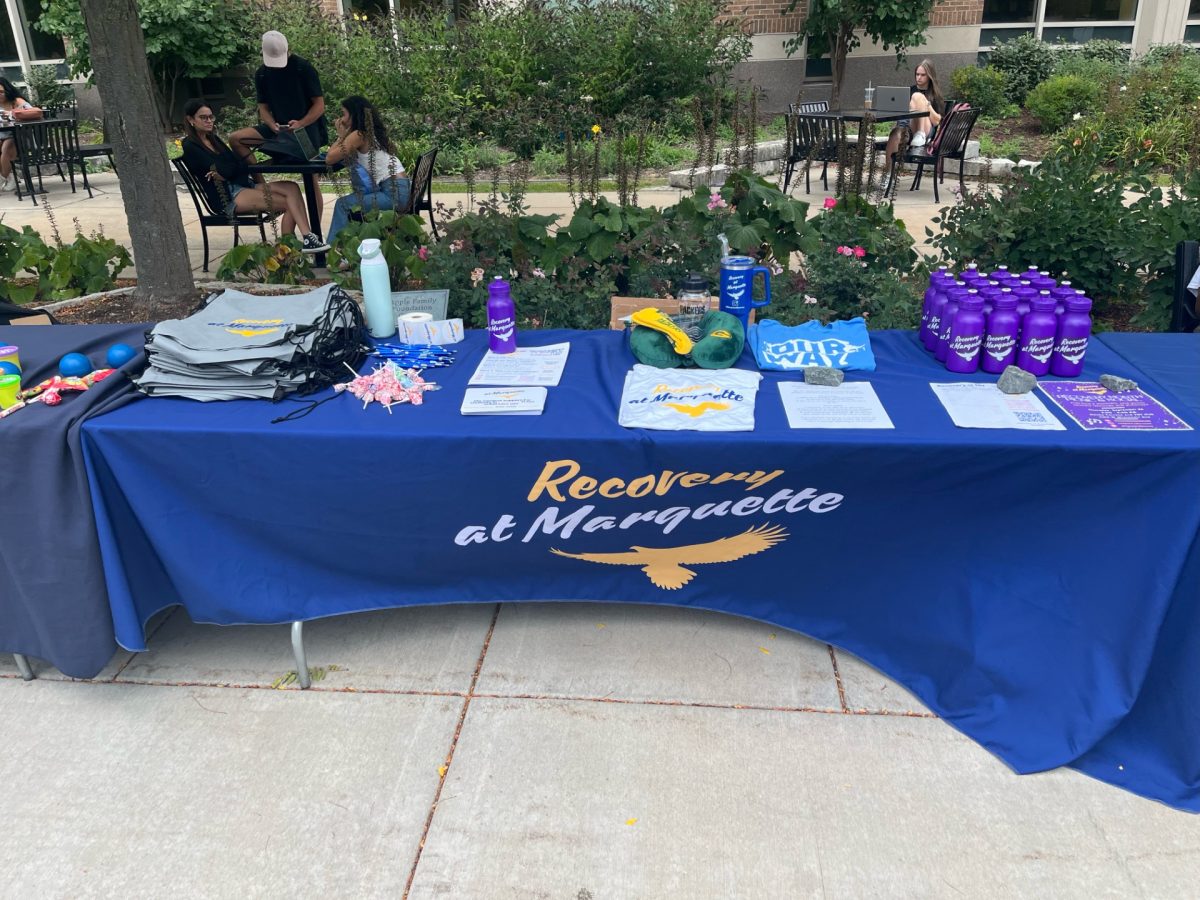Marquette University’s Department of Biomedical Sciences in the College of Health Sciences received a $1.9 million grant on April 4 that will fund neuroscientific research into psychiatric disorders, like addiction and depression.
“The grant award will be used to fund pre-clinical research into how rewarding and aversive stimuli are processed in the brain,” William Cullinan, dean of the College of Health Sciences and director of the Integrative Neuroscience Research Center, said. “This is a very important question because its answer will help us better understand clinical disorders such as addiction and depression, two of society’s most pressing health issues.”
The grant was funded by the National Institutes of Health. Cullinan said their grants are highly competitive.
“Typically, fewer than 10 percent of submitted grants of this kind are funded, and Marquette researchers are thus competing with neuroscientists at research institutions and universities across the nation and world for this funding,” Cullinan said.
Robert Wheeler, an associate professor and faculty researcher in the Department of Biomedical Sciences, said the grant will allow the research team to purchase equipment and other necessary supplies. It will also help with upgrades to equipment and access to new technologies that will further their research.
According to the Marquette news release, the research project funded by the grant is titled “Aversion Signals in the Reward System,” and it will examine how aversive experiences negatively impact people with psychiatric disorders with the goal of managing the negative impact.
“While many people equate disorders like addiction with the rewarding effects of the drug they abuse, it is becoming increasingly clear that aversive life experiences that negatively impact an individual’s life substantially increase the risk for addiction and neuropsychiatric disease,” Matthew Hearing, an assistant professor in the Department of Biomedical Sciences and a primary member of the research team, said.
Even for those without substance abuse issues, Wheeler says daily life stressors cause a change in behavior, like grabbing a pint of ice cream from the freezer.
“Understanding how those daily stressors have a representation in the brain gives us an opportunity to develop better behavioral coping strategies or better pharmacological therapeutics,” Wheeler said.
Wheeler said there is a better understanding of how positive experiences are represented in the brain and how that representation translates to motivated behavior. However, the neuroscience community has less knowledge of negative experiences and their representation in the brain.
“Not knowing how those (negative) experiences are represented in the brain and change our behavior is a major gap in our understanding of brain function and of the human condition because we’re motivated and because we anticipate good things happening to us,” Wheeler said. “But we’re also motivated by the bad things that might happen to us. Why do you study for an exam? It’s usually not because we’re anticipating how great your test score is going to be … It’s usually because we’re afraid of what will happen if we don’t.”
According to the news release, the research team has identified the presence of aversion signals in the nucleus accumbens, an area of the brain responsible for processing pleasurable stimuli.
“Dr. Wheeler’s lab has spent the past few years identifying how these negative experiences are encoded in the brain through a neural ‘aversion signal,'” Hearing said. “If we can better understand what produces it and how it manifests over time with drug exposure, we can identify targets for the development of novel treatments for addiction and neuropsychiatric disease.”
The research team used advanced and invasive techniques on rats and mice to understand how these aversion signals are represented in the brain. To create negative experiences similar to humans, the rats and mice experienced harmless stressors, like an aversive taste.
“What we’ve found is that in animal models, the experience of something that … tastes bad doesn’t cause dopamine increase,” Wheeler said. “It actually causes a reduction in dopamine concentration.”
Dopamine is a neurotransmitter that is involved in reward-motivated behavior, and many addictive drugs increase dopamine.
The research team is trying to understand how the reduction in dopamine translates to someone’s behavior.
“So we’d like to know in conditions like this, does this experience of something bad suppress behavior?” Wheeler said. “Does it reduce motivation, or are there circumstances in which the experience of something bad can actually increase motivated behavior? Maybe (it) increases motivated behavior in order to fix the negative stimuli, and that’s something that hasn’t been understood very well on the level of … neuroscientific studies.”
According to the news release, in people with underlying disorders, the dopamine response to stressful events could trigger addiction and other harmful behaviors.
“We want to know under what circumstances does this aversion-related decrease in dopamine redirect behavior towards healthy alternatives or unhealthy alternatives,” Wheeler said.
Wheeler said the research project is a collaborative effort between his lab, Hearing’s lab and John Mantsch’s, the chair of and a professor in the Department of Biomedical Sciences.
They all had “an interest in identifying how bad experiences — aversive experiences — are represented in activity patterns of the brain and different regions of the brain and how that changes behavior … because all of our experiences have representation in the brain,” Wheeler said.
The research team also includes undergraduate students, like Bethany Windsor, a senior in the College of Health Sciences who has worked for Mantsch, Wheeler and Hearing for two years. She said she feels strongly about Marquette’s research into addiction and depression.
“Both addiction and depression are poorly understood diseases, yet they affect a great deal of people, including many who are close to me,” Windsor said. “Having witnessed people suffer from these diseases, I know how debilitating it can be both on the one suffering and those surrounding them.”
Windsor said she hopes the research will improve treatments for those who suffer from addiction and depression because it currently is not very effective.
“Part of this (ineffectiveness) is due to a general lack of understanding of how they affect the brain,” Windsor said. “I hope that the research that will be funded by this grant can contribute to better understanding of how addiction and depression affect people, and … I would like to see that we are able to better modify the current approved treatments that are being used.”





